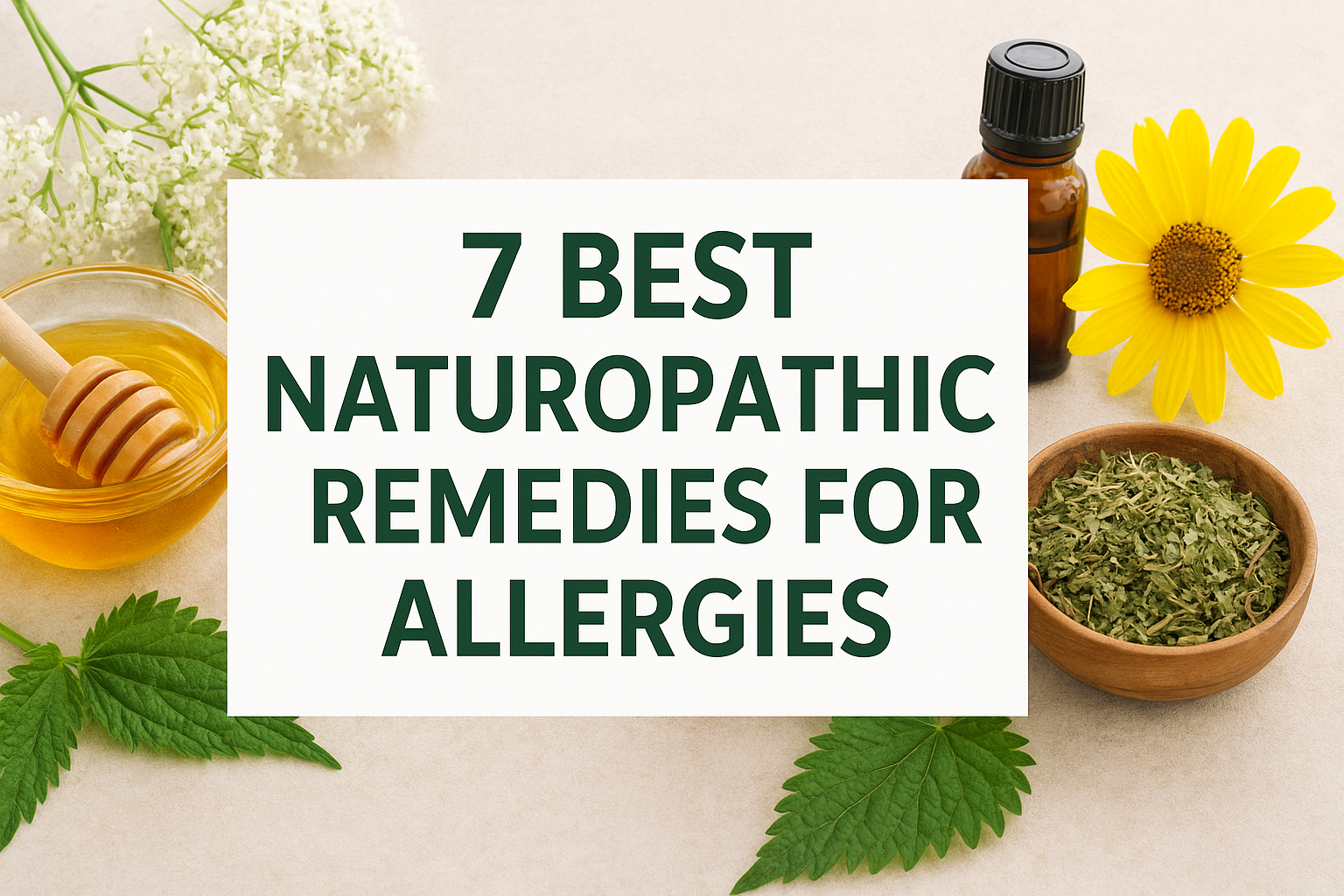Introduction: Natural Relief for Modern Allergies
When spring blooms or dust fills the air, allergies often follow—leaving many sneezing, congested, and fatigued. While antihistamines can provide temporary relief, they may come with drowsiness or side effects. Naturopathy, rooted in natural healing and holistic balance, offers safe, sustainable ways to manage allergies by strengthening the body’s defenses rather than merely masking symptoms.
In this guide, you’ll discover the 7 best naturopathic remedies for allergies—from herbal solutions and detox practices to immune-boosting nutrients—so you can enjoy every season comfortably and naturally.
1. Quercetin: The Natural Antihistamine
Derived from foods like apples, onions, and berries, quercetin is a powerful bioflavonoid known for its ability to stabilize mast cells—the body’s histamine producers. By reducing histamine release, it alleviates sneezing, runny noses, and itchy eyes naturally.
How to Use It
- Dosage: 500 mg twice daily (with meals).
- Best Sources: Red apples, kale, broccoli, capers, and black tea.
- Tip: Combine with Vitamin C for enhanced absorption and antioxidant support.
2. Local Raw Honey: Nature’s Sweet Desensitizer
One of naturopathy’s most delicious remedies, local raw honey may help your body adapt to pollen exposure. By introducing small traces of local pollen, it gradually desensitizes your immune system—much like a natural vaccine.
How to Use It
- Take 1 teaspoon daily before allergy season starts.
- Choose unprocessed local honey to ensure pollen content.
- Avoid heating it, as high temperatures can destroy beneficial enzymes.
3. Nettles (Stinging Nettle): Herbal Allergy Shield
This ancient herbal remedy works as a gentle antihistamine and anti-inflammatory. Nettle leaf extract helps reduce nasal congestion, itching, and watery eyes without causing drowsiness.
How to Use It
- Drink nettle tea (1–2 cups daily).
- Or take freeze-dried capsules (300–500 mg daily).
- Combine with peppermint or licorice root tea for enhanced respiratory support.
4. Probiotics: Gut Health for Allergy Defense
According to naturopathy, allergies often start in the gut—where immune responses are regulated. A balanced gut microbiome reduces overreactions to harmless allergens. Probiotics, especially Lactobacillus and Bifidobacterium strains, strengthen immune tolerance.
How to Use It
- Eat fermented foods like yogurt, kefir, sauerkraut, or kimchi.
- Or take probiotic supplements with at least 5–10 billion CFU daily.
- Consistency is key—results improve after 4–6 weeks of daily use.
5. Saline Nasal Rinse: Clear the Air Naturally
Simple yet effective, a saline rinse (using a neti pot or saline spray) flushes out pollen, dust, and mucus. It soothes nasal passages and reduces congestion naturally.
How to Use It
- Mix 1 cup warm water, ½ tsp salt, and ¼ tsp baking soda.
- Rinse gently once or twice daily.
- Use distilled or boiled water to prevent irritation.
6. Omega-3 Fatty Acids: Anti-Inflammatory Support
Omega-3s, found in flaxseeds, walnuts, and fish oils, reduce inflammation that worsens allergic reactions. Studies in Clinical Nutrition Journal (2024) show omega-3 supplementation decreases nasal symptoms by up to 25%.
How to Use It
- Consume 1 tbsp flaxseed oil daily or fatty fish (like salmon) 2–3 times a week.
- Supplements: 1000 mg fish oil with EPA and DHA.
- Combine with Vitamin E for better absorption and added antioxidant benefits.
7. Butterbur: Nature’s Alternative to Allergy Pills
Often called the “natural antihistamine herb,” butterbur (Petasites hybridus) helps block leukotrienes—chemicals that trigger inflammation and nasal congestion. Clinical trials show it works as effectively as cetirizine (Zyrtec) without sedation.
How to Use It
- Take 50–75 mg twice daily of PA-free butterbur extract.
- Avoid raw or unprocessed forms (they may contain harmful alkaloids).
- Best used during high pollen seasons for symptom prevention.
Additional Naturopathic Tips for Allergy Prevention
In naturopathy, prevention is as vital as treatment. Here’s how to strengthen your immune resilience naturally:
Daily Habits for Allergy-Free Living
- Stay hydrated: Helps thin mucus and flush toxins.
- Follow an anti-inflammatory diet: Include leafy greens, turmeric, and citrus.
- Try aromatherapy: Diffuse eucalyptus or peppermint oil for easier breathing.
- Keep indoor air clean: Use HEPA filters and avoid synthetic fragrances.
- Reduce dairy and sugar intake: They can increase mucus production.
Conclusion: Heal Naturally, Breathe Freely
Allergies don’t have to control your life. By incorporating these naturopathic remedies, you empower your body to find balance and resilience naturally. From quercetin and nettle tea to omega-3s and probiotics, each remedy works in harmony with your body’s healing systems.
Naturopathy reminds us that when we support the body—not suppress it—true relief and wellness follow. This season, choose nature’s wisdom for lasting allergy relief and breathe easy again.
FAQs Section
What are the best natural remedies for allergies?
Quercetin, nettle leaf, probiotics, omega-3 fatty acids, and local honey are among the top naturopathic remedies for allergy relief.
Can naturopathy cure allergies completely?
Naturopathy helps reduce severity and frequency of allergic reactions by addressing the root cause—immune imbalance—though results vary by individual.
Is honey safe for all allergy types?
Honey helps mainly with pollen-related seasonal allergies, not food or pet allergies. Always consult your doctor if allergic to bee products.
When should I start natural remedies for allergies?
Start 2–4 weeks before allergy season for preventive benefits, allowing your body to build tolerance naturally.
Are naturopathic remedies safe with medication?
Most are safe, but consult your healthcare provider if using antihistamines or immune-modulating drugs to avoid interactions.

